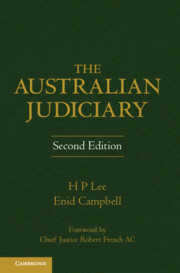Book contents
- Frontmatter
- Contents
- Preface
- Acknowledgments
- Table of Cases
- Table of Statutes
- Chapter 1 Introduction
- Chapter 2 The courts and judges
- Chapter 3 The judiciary as a branch of government
- Chapter 4 Appointment and conditions of service
- Chapter 5 Removal, suspension and discipline of judges
- Chapter 6 Judicial conduct
- Chapter 7 Extra-judicial activities of judges
- Chapter 8 Protecting judicial institutions
- Chapter 9 The accountability of judges
- Chapter 10 A public trust
- Appendix 1 Judicial statistics tables
- Guide to Judicial Conduct
- Index
- References
Chapter 6 - Judicial conduct
Published online by Cambridge University Press: 05 December 2012
- Frontmatter
- Contents
- Preface
- Acknowledgments
- Table of Cases
- Table of Statutes
- Chapter 1 Introduction
- Chapter 2 The courts and judges
- Chapter 3 The judiciary as a branch of government
- Chapter 4 Appointment and conditions of service
- Chapter 5 Removal, suspension and discipline of judges
- Chapter 6 Judicial conduct
- Chapter 7 Extra-judicial activities of judges
- Chapter 8 Protecting judicial institutions
- Chapter 9 The accountability of judges
- Chapter 10 A public trust
- Appendix 1 Judicial statistics tables
- Guide to Judicial Conduct
- Index
- References
Summary
Introduction
Judges are expected to observe high standards of conduct, in both their official and private capacities. Sir Gerard Brennan once said: ‘High standards of judicial conduct are rightly expected by the community, for public confidence in the Courts and Judges is essential to their authority and therefore essential to the rule of law’.
This requirement is reiterated as a fundamental principle by international instruments. The most significant of these instruments, the Basic Principles on the Independence of the Judiciary, requires judges to ‘conduct themselves in such a manner as to preserve the dignity of their office and the impartiality and independence of the judiciary’.
Justice J B Thomas has said that: ‘It is necessary for the continuity of the system of law as we know it, that there be standards of conduct, both in and out of court, which are designed to maintain confidence in those expectations’.
The question arises as to what these standards are. The conduct of judges, both on and off the Bench, is regulated by a combination of rules of law, conventions and ethics. The criminal law, whether expressed via the common law or by statutes, proscribes certain conduct that strikes at the heart of the system of administering justice. These forms of behaviour are so repugnant that they are, or should be, plainly obvious to holders of judicial office. There are other forms of behaviour, however, that do not amount to criminal offences but which, if engaged in by a judge, would affect the standing of the judiciary. A good example is when a judge insists on adjudicating on a matter where he or she has an undoubted vested interest. In such a case, the rule against bias operates to maintain public confidence in the judiciary. In relation to ‘judicial ethics’, Justice J B Thomas observed: ‘The term “ethics”, as understood in the practical sense, commonly refers to a collection of rules or standards of conduct expected of a particular professional group’.
- Type
- Chapter
- Information
- The Australian Judiciary , pp. 152 - 185Publisher: Cambridge University PressPrint publication year: 2012



